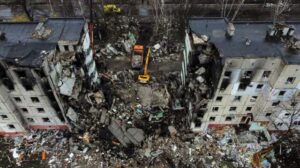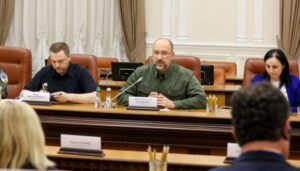
The Ministry of Communities and Territories Development of Ukraine has started the selection of projects under the “Program for the Reconstruction of Ukraine” in accordance with the Financing Agreement between Ukraine and the European Investment Bank (EIB).
As reported on the agency’s website on Friday, the total amount of projects for the first selection is up to €200 million. Projects must be submitted to the Ministry of Regional Development before September 2.
“Projects should refer specifically to the restoration of vital facilities for people. In particular, the renovation or construction of new medical institutions, educational institutions, ATCs, as well as the overhaul and reconstruction of critical infrastructure and homes for internally displaced persons and those who, due to lost his home during the war,” said Oleksiy Chernyshov, Minister for the Development of Communities and Territories of Ukraine.
Among the conditions for participation in the selection are the communal property of the object, for the financing of which a subvention is attracted; co-financing from local budgets and other not prohibited sources to cover the costs of paying taxes and fees; the project implementation period is one to three years; a ban on the purchase or privatization of real estate at the expense of a subvention; taking into account the interests of key parties in local communities; the ability of local authorities to further finance the maintenance of facilities.
The Mirione recalled that at the end of 2021, the government approved the procedure and conditions for providing subventions from the state budget to local budgets for the implementation of projects under the Program for the Restoration of Ukraine. It is envisaged to attract EUR340 million for the restoration of social infrastructure, housing and communal services, etc. in the regions affected by the fighting, as well as in those that received the largest number of migrants.
In addition, earlier Chernyshev said that the EIB allocated EUR1.59 billion to Ukraine for the restoration of damaged infrastructure and critical projects. The funds will be used to restore and modernize the networks of electricity, heat and water supply, housing and communal services that suffered as a result of the fighting.

Prime Minister of Ukraine Denys Shmihal says that the Ukrainian authorities expect to hold an international expert conference in Germany on the restoration of Ukraine in autumn.
“We appreciate Germany’s contribution to ensuring the unity of the European Union in support of Ukraine and measures to counter full-scale Russian aggression. I also want to thank the German side for the fact that, following the results of the G7 summit, German Chancellor Olaf Scholz announced the convening of an international expert conference on the restoration of Ukraine and the creation of an appropriate recovery plan within the framework of the German G7 presidency,” the government press service quotes Shmyhal after a meeting with German Federal Minister of the Interior Nancy Feser and German Federal Minister of Labor and Social Affairs Hubertus Geil.
The prime minister stressed that Ukraine expects such a conference to be held this autumn in Germany, and according to him, the European Commission also expressed its readiness to join the event.
In addition, Shmigal thanked Germany for providing Ukraine with 1 billion euros in grant financial assistance.
The parties also discussed the development of projects in the social sphere, as well as the issue of recognition of Ukrainian documents in the Diya application.
In turn, German Federal Minister of the Interior Nancy Feser said that Germany is ready to help in clearing Ukrainian territories and will do everything in its power to help Ukraine in the war.

The post-war reconstruction of Ukraine should be coordinated by an umbrella structure, including both governmental and non-governmental actors, in order to maximize synergy and efficiency, the Center for Economic Recovery (CEV), operating within the Council for Economic Development under the Cabinet of Ministers, made such a recommendation.
“Determine the responsible body for coordinating (not managing) the recovery process and establish unified coordination mechanisms that will prevent the ineffectiveness of parallel management,” says the CEV report, prepared at the request of the Organizing Committee of the Ukrainian Conference on Recovery, which will be held in Lugano on July 4-5.
The authors of the report point out that thanks to the success of the decentralization program, public administration reform and digitalization of public services, the Ukrainian public administration system is better prepared for the post-war recovery, but there is still a shortage of qualified managers, especially in the regions.
In the opinion of the CEV, the government agencies of Ukraine should be able to effectively and quickly implement the Recovery Plan without excessive involvement or external support from international organizations or local NGOs.
“Thus, Ukrainian public administration must become transparent, citizen-centered, inclusive and fully capable of providing effective governance,” the report emphasizes.
For this, according to the document, a reform of the anti-corruption system and the rule of law (including the cleaning of the High Council of Justice and transparent selection to the High Qualifications Commission of Judges), parliamentary control over the implementation of the Recovery Plan of Ukraine, building the capacity of local government, digitization and automation of the recovery process are necessary ( including e-contracts, reporting, fundraising, etc.).
In addition to the architecture of recovery, the CEV also offers its views on four other priority themes, in its opinion: infrastructural, economic, social recovery and environmental recovery.
In particular, according to experts, when restoring infrastructure, it is worth proceeding from current needs, comply with the digital and green transitions, and fit into integrated territorial plans and master plans of cities.
The CEV also proposes to focus on the development of industrial parks, resume privatization and create a network of business support centers.
With regard to logistics, the report proposes to expand the railway connection with the European gauge, develop ports on the Danube and river links with Europe, reconstruct or build 5-7 airports.
According to experts, the basis for economic recovery will be the preservation of macroeconomic stability, the expansion of economic freedoms, European integration and access to European markets.
The report also highlights the need to ensure access to finance, including through public assistance: wartime subsidies, loan guarantees and interest rate cuts, as well as mortgage coverage, low-risk SME lending.
It is also planned to develop the financial market by attracting venture capital, alternative financing, creating a fund of funds and restarting the capital market with a capital amnesty, pension reform and the medical insurance system.